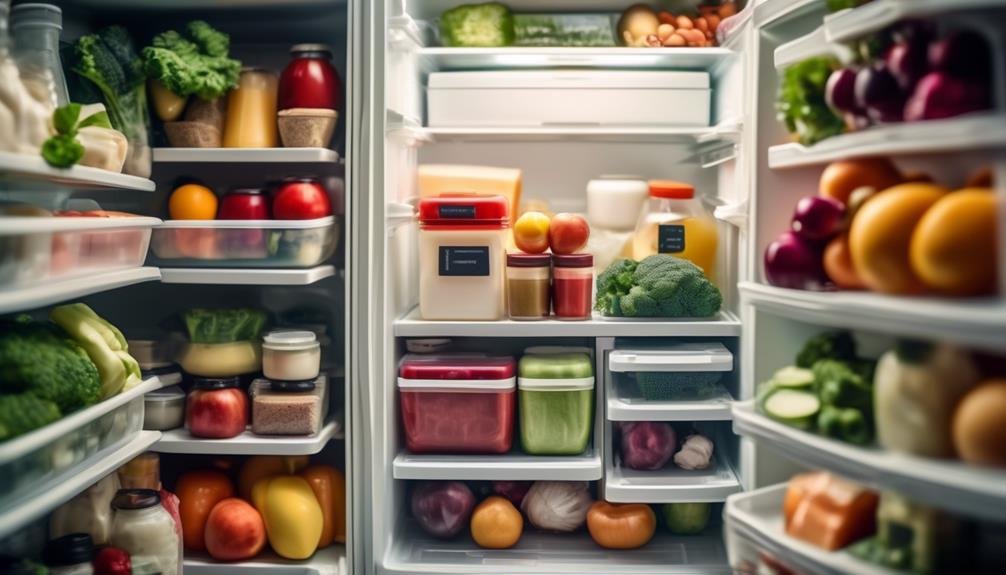"Cherishing Little Steps - A Haven for Baby and Family Journeys"
Reducing Food Waste
Have you ever stopped to think about the amount of food that goes to waste each day? It's mind-boggling, isn't it?
But fear not, there are simple and effective ways to reduce food waste in your everyday life. By implementing a few changes in your planning, shopping, and storage habits, you can make a significant impact.
And that's just the beginning! In this discussion, we will explore various strategies, from creative ways to use leftovers to composting and recycling.
So, are you ready to take action and make a difference?
Key Takeaways
- Incorporate meal prepping into your routine to use up all purchased ingredients
- Practice portion control to avoid overbuying and wasting excess food
- Utilize vacuum sealing and proper storage techniques to extend the shelf life of various food items
- Repurpose leftovers and participate in composting and recycling initiatives to reduce waste and minimize environmental impact
Planning and Shopping Smart

When it comes to reducing food waste, one of the most effective strategies is planning and shopping smart. By incorporating meal prepping and portion control into your routine, you can significantly minimize the amount of food that goes to waste.
Meal prepping is a great way to ensure that you use up all the ingredients you purchase. Take some time each week to plan out your meals and prepare them in advance. This not only saves you time during the week but also helps you avoid buying excess food that may end up unused and eventually thrown away.
Another important aspect of planning and shopping smart is practicing portion control. By being mindful of the amount of food you consume, you can avoid overbuying and wasting excess food. Start by portioning out your meals and snacks according to your nutritional needs. This won't only help you reduce food waste but also lead to healthier eating habits.
Proper Storage Techniques
To ensure that your food stays fresh and lasts longer, it's essential to utilize proper storage techniques. By implementing effective methods such as vacuum sealing and temperature control, you can significantly reduce food waste and save money.
Vacuum sealing is a fantastic way to extend the shelf life of various food items. This method involves removing all the air from the packaging before sealing it, creating an airtight environment that prevents the growth of bacteria and slows down spoilage. It's especially useful for preserving meat, fruits, and vegetables. Investing in a vacuum sealer can be a game-changer for your food storage routine.
Temperature control is another crucial factor in maintaining the quality and longevity of your food. Storing perishable items at the appropriate temperature can slow down the growth of bacteria and help them stay fresh for longer. It's important to refrigerate perishables promptly and set your fridge at the recommended temperature of 40°F (4°C). Additionally, freezing certain items can extend their shelf life even further.
Creative Ways to Use Leftovers

Get creative with your leftovers and transform them into delicious new meals. Leftover recipes are a great way to reduce food waste and save money. Instead of letting your leftovers go to waste, try these creative ideas for repurposing them into tasty dishes.
One option is to make a stir-fry using leftover vegetables, meat, or tofu. Simply sauté your leftovers in a pan with some oil and your favorite seasonings. Add a sauce of your choice, such as soy sauce or teriyaki, and serve over rice or noodles for a quick and easy meal.
Another idea is to turn your leftover chicken into a flavorful soup. Use the bones and scraps to make a homemade chicken broth, then add in any leftover chicken, along with vegetables and grains. Simmer the ingredients together for a comforting and nourishing soup.
If you have leftover bread, don't throw it away. Make breadcrumbs by toasting the bread and then blending it into crumbs. These can be used as a topping for casseroles or as a binder for meatballs or veggie burgers.
Composting and Recycling
Consider composting and recycling as effective ways to reduce food waste and minimize your environmental impact. By implementing these practices, you can contribute to a more sustainable world while also reaping personal benefits.
Here are some reasons why composting and participating in recycling initiatives are worthwhile:
Benefits of Composting:
- Reduces methane emissions: When food waste breaks down in landfills, it produces methane, a potent greenhouse gas. Composting allows organic matter to decompose in an oxygen-rich environment, significantly reducing methane emissions.
- Improves soil quality: Compost enriches soil by providing essential nutrients and improving moisture retention. By composting food waste, you can create nutrient-rich soil amendments for your garden or potted plants, promoting healthier growth.
Benefits of Recycling Initiatives:
- Reduces energy consumption and pollution: Recycling food packaging materials such as glass, plastic, and metal reduces the need for extracting raw materials and manufacturing new products. This saves energy and reduces pollution associated with resource extraction and production processes.
- Conserves natural resources: Recycling food containers and packaging materials conserves valuable resources like water, energy, and forests. By recycling, you help minimize the need for new raw materials and preserve natural habitats.
Raising Awareness and Community Engagement

Raising awareness and engaging the community is crucial in the fight against food waste and creating a more sustainable future. To tackle this issue, local initiatives play a vital role in educating and mobilizing individuals and communities to take action. These initiatives can include organizing workshops, seminars, and awareness campaigns to inform people about the impacts of food waste and the steps they can take to reduce it.
One effective way to engage the community is through food donation programs. These programs not only provide food for those in need but also raise awareness about the importance of minimizing food waste. By partnering with local food banks, shelters, and community organizations, surplus food can be redirected to those who need it most. Encouraging individuals and businesses to donate excess food not only reduces waste but also fosters a sense of community and empathy.
In addition to food donation programs, community gardens and composting initiatives can also help engage the community in the fight against food waste. Community gardens provide an opportunity for people to grow their own food, fostering a deeper connection to the value of food and reducing reliance on store-bought produce. Composting initiatives, on the other hand, enable community members to turn food scraps into nutrient-rich soil for gardening, closing the loop on the food waste cycle.
Frequently Asked Questions
How Can I Involve My Children in Reducing Food Waste?
Involve your children in reducing food waste by teaching them about the importance of using leftovers creatively. Show them how to make delicious meals from scraps and encourage them to come up with their own recipes.
Are There Any Specific Fruits or Vegetables That Spoil Faster Than Others?
Some fruits and vegetables spoil faster than others. To prevent food waste in restaurants, it's important to identify which ones are more prone to spoilage and use them quickly or store them properly.
Can I Freeze Eggs to Prevent Them From Going Bad?
Yes, you can freeze eggs to prevent them from going bad. It's a cracking way to reduce food waste. Just crack them into an airtight container, beat them, and freeze. They'll be good for up to a year!
What Are Some Alternative Ways to Use Stale Bread?
You can repurpose stale bread in creative ways. Try making crunchy croutons for salads, bread pudding for a sweet treat, or breadcrumbs for coating chicken. Don't let that leftover bread go to waste!
How Can I Encourage My Local Grocery Store to Donate Excess Food to Community Organizations?
To encourage your local grocery store to donate excess food, start by talking to the store manager and expressing your support for community organizations. Suggest implementing food waste reduction policies and highlighting the positive impact of donating to local farmers.
Conclusion
Congratulations! By implementing these simple strategies, you have taken a significant step towards reducing food waste and making a positive impact on the environment. Remember, every small action counts, and together, we can make a difference.
So, plan your meals, store leftovers properly, get creative, compost, and spread the word. Let's inspire others to join the movement and create a future where food waste is a thing of the past.
Together, we can achieve a more sustainable and responsible food system.


